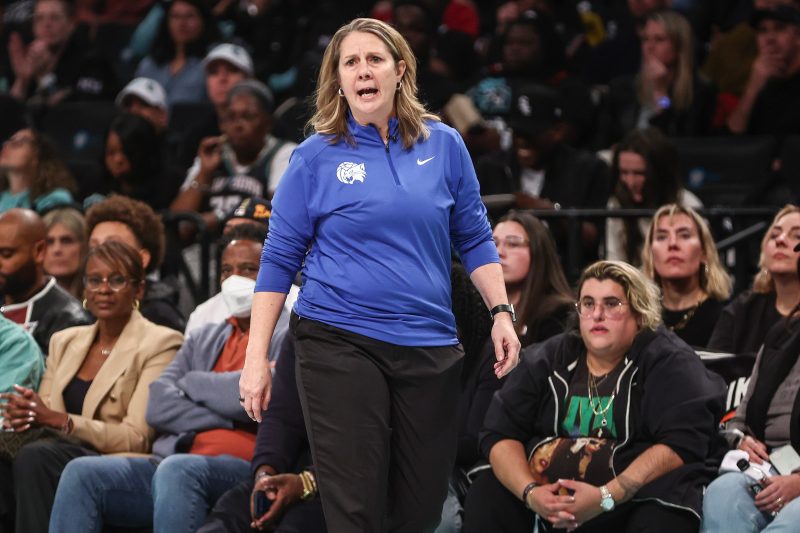When a woman stands up for herself, when she demands to be treated equally and doesn’t tolerate nonsense or disrespect, she’s often described as “difficult.”
Which is really just a polite way of saying she’s a bitch.
You’re not supposed to say that out loud, though, expletives being frowned upon in the public discourse and all that. So difficult becomes a code word. A way of letting everyone know that the woman in question doesn’t know her place without outing yourself as a blatant misogynist.
But every woman who hears it knows exactly what “difficult” really means.
As women command more of the spotlight in our society − there’s an explosion of interest in women’s sports, Kamala Harris could be the country’s first female president, Taylor Swift and Beyoncé are driving economic growth − we’re being forced to think about how we frame women. The negative labels we use for them, in particular.
“It is a word used to hold women down. So I’m offended by that,” said Cheryl Reeve, who’s been called ‘difficult’ a time or 12 while leading the Minnesota Lynx to a record-tying four WNBA titles and the U.S. women to the gold medal at this summer’s Paris Olympics.
“The men that use those words should be more cognizant of the impact of their words, whether it’s me in the WNBA and our organization or whether it’s Sally who works at an accounting firm,” Reeve added. “It is not acceptable for men to call women difficult because they’re confident in themselves or because they’re deemed as aggressive. Because men are permitted to do these things all the time.
“It’s a double standard.”
It’s exhausting, this patrolling of women’s actions and attitudes. We have to be friendly but not too much so. We have to work hard but not be overly ambitious. We have to be tough but still be grateful. We have to be kind and caring while laughing off the insults and condescension.
And God forbid we don’t smile.
“It is really about policing their position, policing the power they have to suppress their power, which thereby reaffirms and maintains the status quo,” said Cheryl Cooky, a professor at Purdue University who studies the intersection of gender, sport and culture.
We’ve grown tired of it. Rather, we’ve grown tired of accepting it. Which is why the growth in women’s sports matters so much, a legion of badass women for whom competitiveness, drive and candidness aren’t just positive character traits, they’re a required skill set.
It’s also why so many women cheered Vice President Kamala Harris’ response to a criticism that she wasn’t “humble” — which is more coded language for being a bitch.
“There are a whole lot of women out here who, one, are not aspiring to be humble,” the Democratic presidential candidate said earlier this month during an appearance on the “Call Her Daddy” podcast.
That doesn’t mean there’s a groundswell of arrogant women or women who are deliberately ignorant of their impact on others. It does mean there are women who are comfortable owning their greatness. Women who recognize their talent, their intellect and their leadership abilities, and refuse to apologize for them or diminish them in order to make others comfortable.
As more and more accomplished, high-profile women − Swift, Beyonce, the rest of the WNBA, the U.S. women’s national team, to name a few − join Harris and Reeve in living unapologetically, it puts everyone on notice. The women who’ve suffered the disrespect in silence. The people who’ve used the term not fully appreciating the harm it causes.
And, most of all, the people who want women to stay firmly under a patriarchal thumb.
“Representation matters. Seeing somebody in that position, it’s, `I’m not alone,’” Cooky said. “If Kamala Harris is having to deal with these issues or Cheryl Reeve, it might be reassuring. It might also be really frustrating. It’s probably both at the same time.
“That response or visibility also creates a culture of being able to speak out or being able to call it out when it happens in your own space,” Cooky added. “It’s a kind of permission for other women to do this as well. It signals, `No, this is not OK.’”
For so long — too long — women have walked on eggshells so as not to offend the power brokers and gatekeepers, almost all of whom were men. We’ve lowered our voices and ambitions so others wouldn’t do it for us. We’ve tolerated, albeit with gritted teeth, the little humiliations in hopes it would, someday, lead to big changes.
But we are done minimizing ourselves to accommodate the insecurities and imagined privileges of others.
‘Something Bill Laimbeer taught me, which I told him was easy for him given his position as a former NBA player, was you can never coach afraid to lose your job. You can never fear that,’ Reeve said earlier this week. ‘But there was a message in there that I took which was, be confident in who you are, what you do and be yourself.’
Doesn’t sound so difficult, after all.
Lindsay Schnell contributed to this report.
Follow USA TODAY Sports columnist Nancy Armour on social media @nrarmour.

